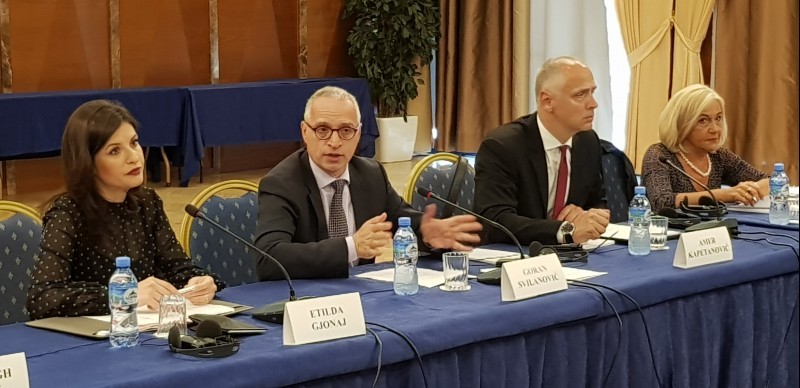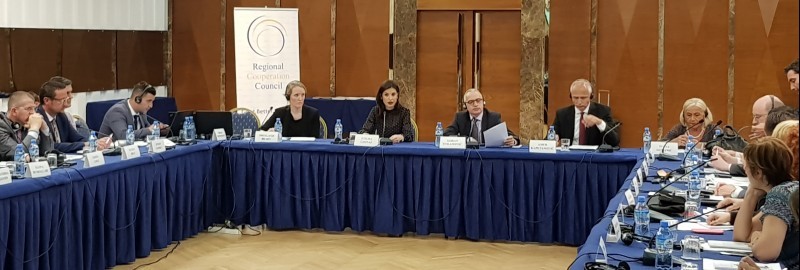- Home/
- News
Combating terrorism and violent extremism cannot be done without full support of judicial institutions

From left to right: Etilda Gjonaj, Albanian Minister of Justice, Goran Svilanovic, RCC Secretary General, Amer Kapetanovic, Head of Political Department of the RCC and Ivana Goranic, organization's Expert on Justice and Home Affairs at the Cooperation of Region’s Judiciary in dealing with Terrorism and Violent Extremism Workshop, in Tirana on 30 May 2018. (Photo: RCC/Natasa Mitrovic)

Participants of the Workshop on Cooperation of Region’s Judiciary in dealing with Terrorism and Violent Extremism, held in Tirana on 30 May 2018. (Photo: RCC/Natasa Mitrovic)
Tirana Workshop: Cooperation of Region’s Judiciary in dealing with Terrorism and Violent Extremism
Tirana – The Regional Cooperation Council (RCC) and Albanian Ministry of Justice are hosting a regional workshop on law enforcement/judicial services and state attorneys/prosecutors in dealing with terrorism and violent extremism and connected crimes, in Tirana today. It gathers judges, prosecutors and experts from the Western Balkans, guests from the international organisations and partner organisations, discussing the issues pertinent to better cooperation in this field.
Etilda Gjonaj, Albanian Minister of Justice welcomed the participants stressing that cooperation of all available mechanisms in prevention and combating terrorism and violent extremisms is a necessity.
„Albanian government is determined in its efforts to prevent and combat violent extremism, terrorism and all related crimes. So far, the Government made every effort to reach that goal. We have adopted all strategic documents, such as the national strategy for combating violent extremism, as well as established a co-ordination centre for violent extremism. However, additional and continuous training of practitioners in all segments of judiciary in this field is still much needed.“
Goran Svilanovic RCC Secretary General addressed the workshop saying that new forms of terrorism activities were taking shape, particularly in cyber space and online radicalisation, which requires establishment of new niches for regional cooperation.
„Combating terrorism and violent extremism cannot be done without full support and participation of judicial institutions in the process. So far we have witnessed resilient and committed work of law enforcement institutions across the region in this domain. Since 2016, region’s courts have found tens of individuals guilty for offenses related to foreign fighting and terrorism, issuing sentences totalling more than 380 years of imprisonment and incarcerating more than 70 individuals in prisons throughout the Western Balkans.”
The participants are debating on issues of legal and law enforcement practices in dealing with cases of radicalization, violent extremism and terrorism, and procedures of document classification and de-classification at courts of justice, in particular related to the cases of violent extremism and terrorism. They will also discuss solutions in judicial practices in dealing with cases of violent extremism and terrorism in judicial procedure and work on improvement of cooperation between judicial and law enforcement authorities and agencies in cross-border counter-terrorism cases.
The event has been organised as a component part of a Centre for Democratic Control of Armed Forces (DCAF) Project/Programme: Integrative Internal Security Governance/ Western Balkan Counter-Terrorism initiative (IISG/WBCTi) ‘Instrument for Pre-accession Assistance (IPA) II 2016 Regional Action on Prevention and Countering of Violent Extremism (P-CVE) in the Western Balkans’ supported by IPA II 2016 Regional Action on P/CVE in the Western Balkans.
A day earlier, also in Tirana, Expert Working Group of South East Europe Military Intelligence Chiefs’ (SEEMIC EWG) met for the 10th time to discuss the state of play in security situation in the region and provide comments to this year’s Open Source Intelligence (OSINT) Assessment ‘Challenges to critical infrastructure cybersecurity in South East Europe (SEE)’. The OSINT (Open Source Intelligence Report) has been drafted at the meeting and will be further discussed and adopted by the High –level SEEMIC meeting scheduled to take place in the fall 2018.


 Development of specialized PCVE web site is funded by EU FUNDS CN 2017-386/831 - "IPA II 2016 Regional Action on P/CVE in the Western Balkans"
Development of specialized PCVE web site is funded by EU FUNDS CN 2017-386/831 - "IPA II 2016 Regional Action on P/CVE in the Western Balkans"